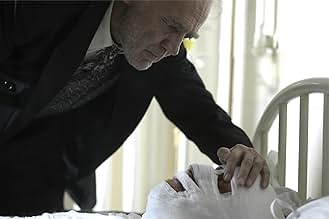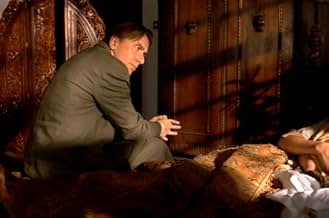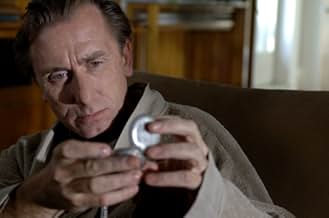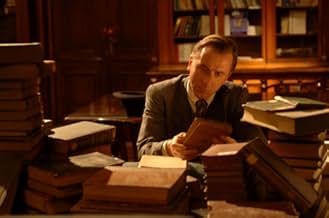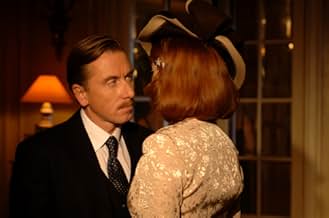NOTE IMDb
6,1/10
15 k
MA NOTE
Une histoire d'amour entourée de mystère. En Europe pendant la Seconde Guerre mondiale, un professeur est métamorphosé par un évènement cataclysmique et explore les mystères de la vie.Une histoire d'amour entourée de mystère. En Europe pendant la Seconde Guerre mondiale, un professeur est métamorphosé par un évènement cataclysmique et explore les mystères de la vie.Une histoire d'amour entourée de mystère. En Europe pendant la Seconde Guerre mondiale, un professeur est métamorphosé par un évènement cataclysmique et explore les mystères de la vie.
- Réalisation
- Scénario
- Casting principal
- Récompenses
- 1 victoire et 1 nomination au total
Dan Astileanu
- Professor
- (as Dan Astilean)
Avis à la une
First of all, i want to express my disgust for people who bash the movie because they didn't enjoy it, or didn't "get it". I accept other people's opinions, it is a free world (most of it anyway), but please stick to just stating your opinion, don't try to change how other people feel about it.
So, in my opinion, first and foremost, if you expect a movie that has drama or action that keeps you glued to your seat, this isn't for you. The plot of the movie has nothing to do with sci-fi, war time action or drama. It is a deeply philosophical movie that appeals to the reality matrix of people, trying to immerse you into some kind of a trance, where you begin to think like the author of the book, and the main character. If you are open minded enough, or a more than average philosophical person, this movie will be quite an experience for you. I know that for me, it was.
I liked it a lot mainly because of the dream/monologue scenes, because they somehow capture the essence of human thought. The doubt, the inner contradictions, the good and the bad sides of the same person. Things that most or all of us do, maybe not in a such out-of-body experience, but it does happen.
I don't want to give to much away, because half of the movie's effect on you has to do with the fact that it catches you off-guard.
So, in my opinion, first and foremost, if you expect a movie that has drama or action that keeps you glued to your seat, this isn't for you. The plot of the movie has nothing to do with sci-fi, war time action or drama. It is a deeply philosophical movie that appeals to the reality matrix of people, trying to immerse you into some kind of a trance, where you begin to think like the author of the book, and the main character. If you are open minded enough, or a more than average philosophical person, this movie will be quite an experience for you. I know that for me, it was.
I liked it a lot mainly because of the dream/monologue scenes, because they somehow capture the essence of human thought. The doubt, the inner contradictions, the good and the bad sides of the same person. Things that most or all of us do, maybe not in a such out-of-body experience, but it does happen.
I don't want to give to much away, because half of the movie's effect on you has to do with the fact that it catches you off-guard.
I was flabbergasted to see that a lot of the comments for this film were negative. The fact that the movie is not of a commercial nature doesn't make it bad, it just makes it less accessible. In this manner, it is just as bad for movies as a science paper is for publications.
Anyway, the film is based on a book of Romanian Mircea Eliade, one that I didn't read. Actually, I didn't read most of Eliade's work for the very reasons people bad mouthed this film. Then I entered adolescence :-P.
The film, though, is a resounding success to me. Not only that it is well done, but at the end of it, it let me wanting to understand more and to read the book. Maybe I will one of these days. As the film is impossible to summarize here, I will get to a quick conclusion.
Bottom line: a heavy feeling film, with a complex script and a lot of philosophical ideas of Eliade's scattered through the story; also some of his personal obsessions: orientalism and the loss of the love of his life. I personally think it was a great movie, but it became a bit confused at the end.
Anyway, the film is based on a book of Romanian Mircea Eliade, one that I didn't read. Actually, I didn't read most of Eliade's work for the very reasons people bad mouthed this film. Then I entered adolescence :-P.
The film, though, is a resounding success to me. Not only that it is well done, but at the end of it, it let me wanting to understand more and to read the book. Maybe I will one of these days. As the film is impossible to summarize here, I will get to a quick conclusion.
Bottom line: a heavy feeling film, with a complex script and a lot of philosophical ideas of Eliade's scattered through the story; also some of his personal obsessions: orientalism and the loss of the love of his life. I personally think it was a great movie, but it became a bit confused at the end.
I was surprised and fortunate to find a movie of this caliber by chance, since I'd never heard of the release; at first, I actually thought it was an old movie, one that I hadn't seen.
I' am bewildered and frankly frightened by the obscene IMDb rating of "6.6" - the current evaluation of this movie, by the audiences frequenting these boards - a prime example of the fact that taste is a controversial matter.
Albeit, this movie isn't for everyone; if you regard the world as being a solved puzzle, if you've figured it all out; what it's all about, if nothing mystifies or captivates your senses and entelechy, if you are utterly unenchanted by the magical and mysterious nature of reality, this movie will be a huge disappointment for you. Please don't watch it, since it's not made for you, and hence, you will distort the perception of the movie. In-fact, if any of the latter apply, don't watch this movie, it will only bring grieve.
The movie is stunning in its appearance, the characters are believable, the story is uncompromising, relentless, of an epic nature, and the atmosphere is hypnotic and enchanting.
I was sucked into the world of this strange professor.
I only regard the ending as being less then perfect; however, such movies are never easy to end.
An essential and unique experience.
I' am bewildered and frankly frightened by the obscene IMDb rating of "6.6" - the current evaluation of this movie, by the audiences frequenting these boards - a prime example of the fact that taste is a controversial matter.
Albeit, this movie isn't for everyone; if you regard the world as being a solved puzzle, if you've figured it all out; what it's all about, if nothing mystifies or captivates your senses and entelechy, if you are utterly unenchanted by the magical and mysterious nature of reality, this movie will be a huge disappointment for you. Please don't watch it, since it's not made for you, and hence, you will distort the perception of the movie. In-fact, if any of the latter apply, don't watch this movie, it will only bring grieve.
The movie is stunning in its appearance, the characters are believable, the story is uncompromising, relentless, of an epic nature, and the atmosphere is hypnotic and enchanting.
I was sucked into the world of this strange professor.
I only regard the ending as being less then perfect; however, such movies are never easy to end.
An essential and unique experience.
It was bound to happen that Youth Without Youth, the first film written and directed by Francis Ford Coppola in fifteen years (the first directed in ten), would be lauded by the critics for not being a real "comeback" kind of project. It's surreal, philosophical, mystical, and even has a mood about it that calls as a throwback to old romantic melodramas of the 40s and 50s (hence the opening titles). It's not even any kind of great film. It's pretentious in a few stretches, maybe more-so, and it takes a convoluted explanation that comes second in 2007 film only to Southland Tales for being more complex and bizarre. But unlike Kelly's film, Coppola at least has a hold on what he's doing, or what he's trying to accomplish. Coppola once said that art is all about taking riks, and to make films without risk is like sex without children.
In the grand scheme of things, at least with his career, Youth Without Youth seems to be slightly minor a risk when compared to the likes of Apocalypse Now or One From the Heart. But it's a risk that Coppola takes all the same, and through the intellectual thicket (which, contrary to some critics, isn't completely dense) there is some truly potent cinematic expression. So, the plot, the plot... A linguistics professor, Dominic (Tim Roth) is an old man when he gets struck by lightning in 1938, then proceeds to age back to 40 in recovery, only to then find that he's being watched- and planned for abduction- by Nazi scientists who want to use his newfound super-powers (mostly that he can, at times, harness powerful energy, as Dominic describes as "out of a science fiction novel"). This might be enough for a movie alone, but there's more- years later, a woman from Dominic's past (from before the lightning strike) appears again, also still apparently young, and she can talk in ancient languages, so then...
Yeah, I could go on with that. Suffice to say there's also talk about how this whole time-warp connects into the realm of consciousness itself, or what makes up knowledge or the pursuit of language, and all relating to time, leading up to an ending that flips around itself, all inspired by an old Chinese tale that goes around and around. What it means I still can't quite figure, and it at least shows Coppola won't spoon-feed any kind of easy ending (even the whole "it's only a dream" concept has some holes to fill, leaving ambiguity as something a little more logical). Frankly, I've never read any of the Mircea Eliade's writings, but there's a lot to it that strikes up references to other works. I couldn't help but think the plot, and its themes, were as though Philip K. Dick was forced to make a melodrama- on his own terms- from an unpublished book. Or that there was a connection to the Fountain, or even Dr. Who or something else. The comparisons are endless.
But what remains, at the end of trying to figure out what the hell Youth Without Youth will say as its ultimate message, is an original work, sincerely with the verve of a filmmaker who just says 'f*** it' and makes the movie he wants to make on his own terms (with, subsequently, his own money). If there is any risk to the project it's that Coppola gambles on narrative cohesion with elements like two Dominics following the lightning strike (one of which, of course, prods the other to complete his life's work as a "failure"), or the power of emotion with two people in love vs. the tremendous, daunting task of unlocking secrets of language and consciousness and what time even means. Couple this with technique that veers into the abstract, with upside down camera angles and upfront anti-Nazi imagery ala Indiana Jones, and a music that strikes up the most melancholy and precise of aforementioned melodrama, and it becomes the weirdest hybrid Coppola's ever made.
And yet, and yet, if Youth Without Youth is one thing above all else, it's, well... interesting. I never felt like getting up and even leaving to go to the bathroom much less leaving the film for good. I cared about Dominic and Veronica as I did the direction Coppola took the story (even if pretensions, particularly in the second half, seemed to loop into the equation). And Roth is, not to forget to mention, terrific in the role, seeming to understand where his character may (or may not) be headed as he continues with his research and finds that he is sort of doomed in time unless he goes down a certain path. He even gets to dig into a certain subdued humor underneath the skin of the picture, where a few times there's some laughs to be had at the expense of what's going on with Dominic, as though some old philosopher discovered a comic book and incorporated it into his character. It's a very strange movie experience, and not one I can easily recommend. But I do all the same, and Coppola fans will either like it or, as case is turning out, they wont.
In the grand scheme of things, at least with his career, Youth Without Youth seems to be slightly minor a risk when compared to the likes of Apocalypse Now or One From the Heart. But it's a risk that Coppola takes all the same, and through the intellectual thicket (which, contrary to some critics, isn't completely dense) there is some truly potent cinematic expression. So, the plot, the plot... A linguistics professor, Dominic (Tim Roth) is an old man when he gets struck by lightning in 1938, then proceeds to age back to 40 in recovery, only to then find that he's being watched- and planned for abduction- by Nazi scientists who want to use his newfound super-powers (mostly that he can, at times, harness powerful energy, as Dominic describes as "out of a science fiction novel"). This might be enough for a movie alone, but there's more- years later, a woman from Dominic's past (from before the lightning strike) appears again, also still apparently young, and she can talk in ancient languages, so then...
Yeah, I could go on with that. Suffice to say there's also talk about how this whole time-warp connects into the realm of consciousness itself, or what makes up knowledge or the pursuit of language, and all relating to time, leading up to an ending that flips around itself, all inspired by an old Chinese tale that goes around and around. What it means I still can't quite figure, and it at least shows Coppola won't spoon-feed any kind of easy ending (even the whole "it's only a dream" concept has some holes to fill, leaving ambiguity as something a little more logical). Frankly, I've never read any of the Mircea Eliade's writings, but there's a lot to it that strikes up references to other works. I couldn't help but think the plot, and its themes, were as though Philip K. Dick was forced to make a melodrama- on his own terms- from an unpublished book. Or that there was a connection to the Fountain, or even Dr. Who or something else. The comparisons are endless.
But what remains, at the end of trying to figure out what the hell Youth Without Youth will say as its ultimate message, is an original work, sincerely with the verve of a filmmaker who just says 'f*** it' and makes the movie he wants to make on his own terms (with, subsequently, his own money). If there is any risk to the project it's that Coppola gambles on narrative cohesion with elements like two Dominics following the lightning strike (one of which, of course, prods the other to complete his life's work as a "failure"), or the power of emotion with two people in love vs. the tremendous, daunting task of unlocking secrets of language and consciousness and what time even means. Couple this with technique that veers into the abstract, with upside down camera angles and upfront anti-Nazi imagery ala Indiana Jones, and a music that strikes up the most melancholy and precise of aforementioned melodrama, and it becomes the weirdest hybrid Coppola's ever made.
And yet, and yet, if Youth Without Youth is one thing above all else, it's, well... interesting. I never felt like getting up and even leaving to go to the bathroom much less leaving the film for good. I cared about Dominic and Veronica as I did the direction Coppola took the story (even if pretensions, particularly in the second half, seemed to loop into the equation). And Roth is, not to forget to mention, terrific in the role, seeming to understand where his character may (or may not) be headed as he continues with his research and finds that he is sort of doomed in time unless he goes down a certain path. He even gets to dig into a certain subdued humor underneath the skin of the picture, where a few times there's some laughs to be had at the expense of what's going on with Dominic, as though some old philosopher discovered a comic book and incorporated it into his character. It's a very strange movie experience, and not one I can easily recommend. But I do all the same, and Coppola fans will either like it or, as case is turning out, they wont.
I saw mention of "Altered States" in the comments section, but I think a more apt parallel might be "The Fountain" by Aronofsky. In that film, an intellectual pursuit is pitted in juxtaposition to the more human pursuit of love. In "The Fountain" science is the pursuit and it is employed towards the end of salvaging a relationship, whereas with Coppola the pursuit is philosophy and its pursuit decidedly comes first symbolically and then physically at the unraveling of love.
So, yes this is a cerebral film. One that is driven often by dialog, including dialog conducted between a man and his double...and also in a language of the protagonists own creation. And yet the message here, while convoluted never came across as mere gibberish to me.
Instead, I hear the echoes of an old man, Coppola, who perhaps has seen his own life, and maybe lives of those around him, consumed by his own calling. And with the double, what film maker cannot feel the presence of a vying reality. Here we have mirrors, like Coppola's "Rumble Fish" shadows, that do not match the reality they should reflect.
I felt like the lightning strike could be seen as a character's epiphany that he is indeed a character in a story. More fifth dimension than fourth wall. But nonetheless fascinating. A superhero of sorts is born, but not exactly a Marvel.
Back to Aronofky's "Fountain" that film for me got bogged down in the trompe du CG-eye, whereas in "Youth Without Youth" whoever did the scenery scouting should be applauded. I felt more grounded in the real, yet often captivating, world filmed. (Was Malta, Malta or just another aspect of Romania?) Too bad I didn't feel the same way about casting, although others here have lauded Roth and Ganz, they were weaker links for me in their particular roles. Clearly Roth's role/s was/were demanding, for me he has the nervous energy of someone looking over his shoulder, more than a man lost in an inward gaze. A better maniac than a monomaniac. And Ganz, it felt like all of his lines were re-dubbed, to the point of a CGI-level distraction.
Nonetheless, a film with tricky mirrors provides some interesting reflection. Ultimately the film neither flaunts love as the salvation, nor rigorous study as providing an ultimate reward. For me the message was not even mystical, but simply that nature will claim every man.
Sure as the snow...
So, yes this is a cerebral film. One that is driven often by dialog, including dialog conducted between a man and his double...and also in a language of the protagonists own creation. And yet the message here, while convoluted never came across as mere gibberish to me.
Instead, I hear the echoes of an old man, Coppola, who perhaps has seen his own life, and maybe lives of those around him, consumed by his own calling. And with the double, what film maker cannot feel the presence of a vying reality. Here we have mirrors, like Coppola's "Rumble Fish" shadows, that do not match the reality they should reflect.
I felt like the lightning strike could be seen as a character's epiphany that he is indeed a character in a story. More fifth dimension than fourth wall. But nonetheless fascinating. A superhero of sorts is born, but not exactly a Marvel.
Back to Aronofky's "Fountain" that film for me got bogged down in the trompe du CG-eye, whereas in "Youth Without Youth" whoever did the scenery scouting should be applauded. I felt more grounded in the real, yet often captivating, world filmed. (Was Malta, Malta or just another aspect of Romania?) Too bad I didn't feel the same way about casting, although others here have lauded Roth and Ganz, they were weaker links for me in their particular roles. Clearly Roth's role/s was/were demanding, for me he has the nervous energy of someone looking over his shoulder, more than a man lost in an inward gaze. A better maniac than a monomaniac. And Ganz, it felt like all of his lines were re-dubbed, to the point of a CGI-level distraction.
Nonetheless, a film with tricky mirrors provides some interesting reflection. Ultimately the film neither flaunts love as the salvation, nor rigorous study as providing an ultimate reward. For me the message was not even mystical, but simply that nature will claim every man.
Sure as the snow...
Le saviez-vous
- AnecdotesLanguages spoken in the film are English, French, Italian, Mandarin, German, Russian, Latin, Armenian, Sanskrit, Egyptian (not Arabic), Babylonian and a little Romanian. The ancient Sanskrit, Egyptian and Babylonian are authentic, researched in ancient texts and manuscripts by a team of expert linguists. The film also includes an artificial, "made-up" language, done with such integrity that it could provide the rudimentary basis of a new language.
- GaffesThe panoramic x ray shown when the teeth of the main character start to change is obviously from a 12 years old person as are clearly visible temporal molars (that are not present in adults) and their adult successors.
- Bandes originalesMiddle Village
Written by Lev Zhurbin (as Lev 'Ljova' Zhurbin)
Performed by Lev Zhurbin (as Lev 'Ljova' Zhurbin) on viola and Balogh, Kálmán (cymbalom)
Meilleurs choix
Connectez-vous pour évaluer et suivre la liste de favoris afin de recevoir des recommandations personnalisées
Détails
- Date de sortie
- Pays d’origine
- Site officiel
- Langues
- Aussi connu sous le nom de
- Youth Without Youth
- Lieux de tournage
- Sociétés de production
- Voir plus de crédits d'entreprise sur IMDbPro
Box-office
- Budget
- 5 000 000 $US (estimé)
- Montant brut aux États-Unis et au Canada
- 244 397 $US
- Week-end de sortie aux États-Unis et au Canada
- 28 550 $US
- 16 déc. 2007
- Montant brut mondial
- 2 624 759 $US
- Durée2 heures 4 minutes
- Couleur
- Mixage
- Rapport de forme
- 2.35 : 1
Contribuer à cette page
Suggérer une modification ou ajouter du contenu manquant

Lacune principale
By what name was L'homme sans âge (2007) officially released in Canada in French?
Répondre






